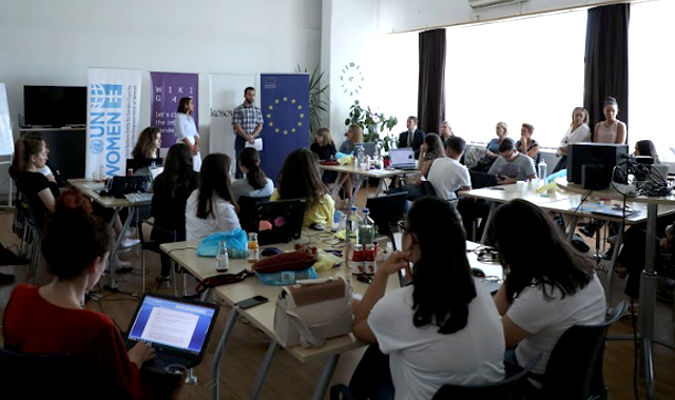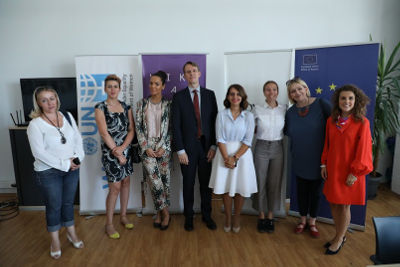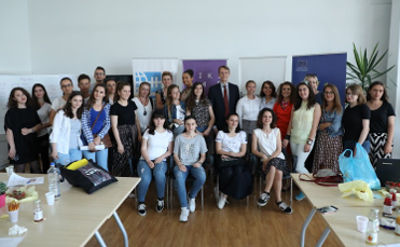#WikiGap Edit-A-Thon in Kosovo boosts content on Wikipedia about women’s role in peace and security
On the occasion of "International Day of United Nations Peacekeepers", a “Wiki-Edit-A-Thon” event is organized in Pristina by UN Women, in partnership with the Swedish Embassy and Kosovalive news agency, to boost the voices of women and girls online and increase content on Wikipedia about women’s inclusion and contribution to peace and security.Date:

Young girls and boys from across Kosovo[1] participated in a one-day “Wiki-Edit-A-Thon”, to boost the number of articles online about women’s inclusion and contribution to peace and security worldwide.
The event, organized by UN Women, in partnership with the Swedish Embassy in Pristina and Kosovalive news agency, aimed to provide more space for women and girls online by including more women contributors on Wikipedia and increasing content on the women, peace and security agenda.
Although there is mounting evidence that women are powerful actors in sustaining peace, there is still a need to ensure women’s representation at all levels of the transitional justice process in Kosovo. The event also aimed to draw attention to the various impacts of the armed conflict on women and girls, the importance of their inclusion in transitional justice processes, and the complex links between gender equality and peace and security in the world.

“Lack of gender equality is a universal issue and everyone gains by changing it. Research, our own experience and the experience of others show that gender equality contributes to greater well-being and peaceful societies. Sweden is the first country in the world with a feminist foreign policy. It emanates from a moral conviction based on justice and human rights. Also, because gender equality is a basic condition for peace, security and sustainable development,” said Henrik Nilsson, the Ambassador of Sweden in Kosovo in his opening remarks at the event.
Annette Fath-Lihic, EU Special Representative, Chief Political Adviser/Executive Coordinator, European Union Office in Kosovo, stressed that societies that give equal opportunities for women to participate freely in the social, political and economic life are more peaceful and progressive societies.
“Although almost 20 years have passed since the conflict, further efforts are still needed in Kosovo to address violations of human rights during the conflict, through inclusive processes, and to work on building a more prosperous and peaceful future,” said Rozafa Kelmendi, Project Manager at UN Women, emphasizing the importance of including a gender perspective in addressing human rights violations during the conflict in Kosovo.

“Through events and workshops like WikiGap, girls and young women understand that their actions are directly related and contribute to peace-building and security in their communities. Such events provide an opportunity to get familiar with the concepts of peace and security and help them see themselves as important contributors to these processes,” said Annea Hapçiu, Director of Development at KosovaLive.
On her inspirational speech about her journey as an activist, Igballe Rogova, Executive Director of Kosovo Women’s Network underlined the importance of engaging youth in processes related to gender equality, peace and security.
This event is a part of the global #WikiGap campaign, originally launched by Wikimedia Sweden and the Swedish Ministry for Foreign Affairs. Similar events have already been held in more than 50 countries worldwide to improve women’s representation on the internet and help create a more gender-equal world.
The event organized in Pristina, is part of the UN Women project Gender Sensitive Transitional Justice, funded by the European Union.
[1] All references to Kosovo on this website shall be understood to be in full compliance with UN Security Council Resolution 1244 (1999).